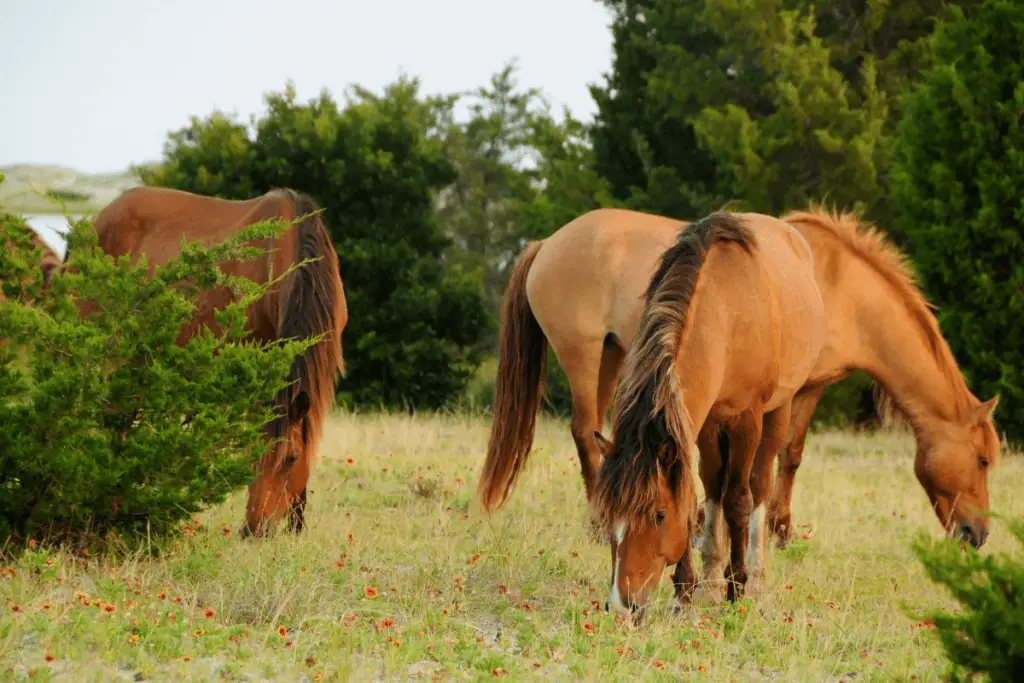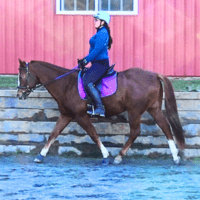There are animals that can be found traveling and living on their own like leopards and bears. Then there are the animals that like to travel in groups, such as wolves, cattle, lions, horses.
There are different names for groups of animals depending on the species. A group of wolves would be a pack, a group of lions a pride, while a group of cattle or horses would be considered a herd.
Horses are herd animals meaning they are gregarious, they like the company of other horses, and they are grazers. Horses like to socialize with each other and develop relationships. They may not vocalize much but horses are constantly communicating with each other through body language, a topic I will be covering in an upcoming blog post.
Being In A Herd Means Safety
When a horse is in a herd they are safer than if they are on their own. There are more eyes, ears and noses, to alert the herd of any potential dangers. Together they make it harder for a predator to catch one of them, whereas alone a horse would become a much easier target.
If you have worked with horses for some time you may have noticed that many times horses get antsy when they leave their other horse buddies.
You might be going on a trail ride without the other horses and your horse stops or calls back to them. Maybe your horse might try to turn around and go back to the barn. You may also notice that your horse acts more spooky or on edge than when you ride in the arena near other horses.
You can also see this behavior with some horses when you put them in a stall, especially if they are the only ones in the barn. They may pace, weave, paw, or whinney incessantly.
These are just some examples of horses getting anxiety when separated from “their herd.” They are not being ridiculous. They are not being bad. They are not crazy.
It is normal for a horse to be like this. Remember I said being in a herd means safety and being alone could mean becoming a snack for a pack of wolves.
So once you take a horse away from what they consider their herd they are alert to the fact that they are more vulnerable to threats, so they are more focused on any potential dangers.
Horses Don’t Like To Be On Their Own

You may think, well not all horses are like this. Maybe you work with horses that don’t mind being on their own. Ultimately horses don’t like to be on their own, even horses that seem okay.
There are several factors for why a horse may seem calm, content, or okay with being on its own. Here’s a list of some of the reasons a horse may be okay.
- They have a sense of trust and safety toward the rider or handler.
- They are trained to accept being away from other horses.
- They have a higher tolerance level. There is a spectrum of sensitivity within horses. Some are more reactive and sensitive than others.
Now even if a horse seems comfortable on its own, for the horse’s wellbeing it should never live on its own. They not only need that feeling of safety but companionship as well.
If you do have a horse that panics when alone or taken away from its pasture buddies, just realize, your horse is fearful and needs kindness, patience, reassurance, and training to overcome the problem.
In the last blog post part 2, I mentioned that horses cannot learn through fear. They become too focused on fear to focus on anything else, learning included.
So don’t lose your temper when your horse acts like this and feels like you need to give them a lesson, instead come up with a gradual training plan to build trust, and confidence to overcome the separation anxiety.
Horses Have Relationships & Hierarchy In The Herd
I said above horses need companionship. A herd is like a family and they look out for each other, hang out with each other and just enjoy each other’s company.
Horses also have a hierarchy in the herd. It is dynamic and changing, but typically between two horses, one horse will be higher on the pecking order.
Making the horse’s feet move is the name of the game. A horse that controls another horse’s movement is the horse in charge. There is typically a lead mare that is head of the herd and a stallion that protects the herd. Other than young colts there is usually one 1 stallion in a herd. Young bachelor stallions often form what’s called a band, another name for a herd but with all stallions.
This compulsion for horses to be in a herd is instinct and in the next blog post, I will be covering the instincts of the horse.
Posts In This Series
- Understanding Horse Behavior Before You Work With Horses: Equine Psychology Mini Series | Part 1 Intro
- Horses As Prey Animals: Equine Psychology Mini Series | Part 2
- Horses As Herd Animals: Equine Psychology Mini Series | Part 3
- Horse Instincts: Equine Psychology Mini-Series | Part 4
- Horse Communication 101: Equine Psychology Series Part 5
In the next post coming out on Oct 22nd, we will be going over horses as herd animals. If you want to be emailed the post sign up for the email list.
If you have any questions about horses as prey animals, email me at [email protected] and if it is helpful to others it may be featured in this post.
Cheers, Kacey

